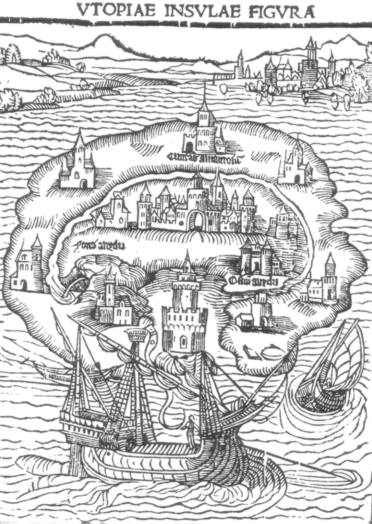Liberty, Fraternity and Freedom: Exploring Social and Political Philosophy
The Utopian Society
MINDS ON
“
If we don’t begin by imagining the perfect society, how shall we create one?
~ Isabel Allende, Chilean-American author.

Humans have long dreamed of creating the perfect society. To people disappointed with the system in which they live, the route to such a utopia always seems obvious: “Let’s just do X. Then Y will happen, and everyone will be happy!”
However, as you have learned in this unit, the route to this utopian ideal is not so easily travelled. We have examined various political ideologies that all profess to having that special ‘X’ that will automatically make ‘Y’ happen, yet, not one has led us to its promised utopia.
This leads us to ask, “Is a utopian society even possible?”
 Philosopher's Notebook Revisited
Philosopher's Notebook Revisited
In Activity 1 of this unit, you were prompted to define what you felt were the aspects and characteristics of a ‘perfect’ society. Go to your Philosopher's Notebook now, and look at your archived entry. Are there any items listed that you would omit, given what you have learned in this unit of study? Is a Utopia even possible? Is there anything you would add? Keep this in mind as we will revisit it later.
ACTION
Thomas More’s Utopia
While Plato’s Republic is an example of how to organize a utopian society (at least by Plato’s standards), when we speak about utopias, the person most commonly mentioned is Thomas More.
Utopia is written as a fictional story, recounted by a traveller called Raphael Hythloday. He describes to More an island paradise located on the far side of the world. In this novel, More imagined a complex, self-contained world set on an island, in which people live under a democratic political system.

Utopia is a nation based on rational thought. There is no such thing as private property - people live communally. There is no rapacious love of gold, no real class distinctions, no poverty, little crime or immoral behavior, there is religious tolerance, and little inclination to war. The work day is only six hours long, with people encouraged to educate themselves during their leisure time.
Sounds idyllic, doesn’t it? And certainly scholars have drawn parallels between More’s sixteenth century London and how Utopia represents the antithesis of much of his real world.
However, the seeming perfection of Utopia begins to tarnish once More goes into further details. For instance, this utopia contains people who are enslaved, and on certain festive days wives fall down at their husbands’ feet, confessing that they have performed some domestic duty negligently. Everyone is dressed the same to limit any unnecessary display of pride. Adultery is punishable by slavery. And, while all religions are tolerated, atheists are despised as they cannot be trusted to share the communal life of Utopia since they have no belief in any punishment or reward in an afterlife.
While Utopia could be considered something of a prototype for what we might term as Communism, More’s vision of Utopia was heavily influenced by his faith. He was a passionate defender of Catholic orthodoxy during the Reformation of the Catholic church. His arguments with King Henry VIII, who was known for his stubbornness and his dismissive response to counsel that was contrary to his wishes, may be reflected in the book, for example, when Hythloday praises democracy by pointing out that it is useless to counsel kings who only listen to those who curry favour.
Indeed, in real life, More eventually resigned his position as Chancellor of England and was eventually executed for treason.
Utopias - Failed Experiments in Social Engineering
Moore wasn’t the only philosopher to imagine a more perfect society. Most of the philosophers we studied in the unit have imagined the same thing - some have even gone further and attempted make their theories a reality. From Plato to Rousseau, from Fascism to Totalitarianism, most of these attempts at social engineering have failed.
FailedExperimentsinSocialEngineering
CONSOLIDATION
“
Ultimately we may still ask, why can’t humans design a perfect society?
~ Robert Shea, American novelist and journalist.
Is a utopian society an achievable aim?
At some point, we need to ask ourselves this question because, certainly we have seen enough examples of what can go wrong, despite the best intentions and the most reasoned and well thought-out philosophies or theories.
In the round table sessions, you explored some very specific issues that impede our society from being as just, as fair, and as ‘perfect’ as it could be. In Activity 1, you were asked to imagine what characteristics and factors you felt would be - or should be - part of a utopian society.
Reflecting on what you have learned since then, do you think there is a way to ever have these factors in place? If so who has the greatest amount of responsibility in making our society better than what it is now - is it the state - or is it the individual?
 The Philosopher’s Notebook: A Perfect State
The Philosopher’s Notebook: A Perfect State
In your Philosopher’s Notebook, summarize what you have learned in this unit by responding to the five questions listed below. Use specific evidence from the round table sessions to support your reasoning.
- Ultimately, what is the role of the social contract? Can it ever be truly fair to all parties?
- Does the government or state have a responsibility to adhere to the needs of status quo over the needs of the individual?
- Should we as individuals have the ability to ‘opt out’ of the social contract if it fails to live up to ‘our’ expectations? Or, is this another example of self-interest and self-preservation, the very thing that the social contract is supposed to prevent?
- Who has more authority, the people or the state? What is the inherent danger of either party having more power than the other?
- Can philosophy assist us in finding and achieving a just and a ‘utopian’ state?